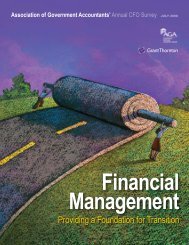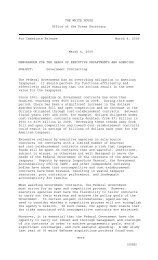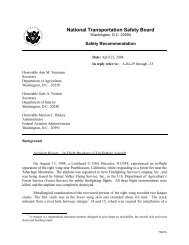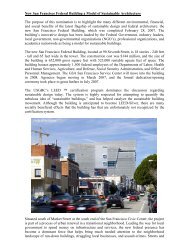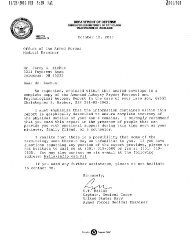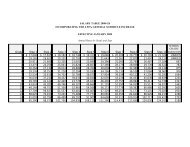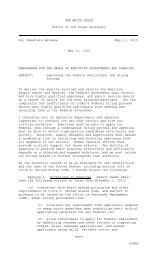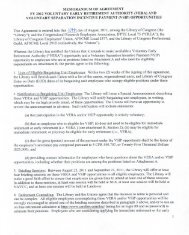Accenture's fifth annual global e-government study
Accenture's fifth annual global e-government study
Accenture's fifth annual global e-government study
Create successful ePaper yourself
Turn your PDF publications into a flip-book with our unique Google optimized e-Paper software.
eporting and the exchange of personal information<br />
between <strong>government</strong> agencies. This action plan is<br />
being supplemented by status reports twice a year.<br />
Based on its most recent status report, e-Norway:<br />
Status Report June 2003, Norway is progressing<br />
well in some areas and more slowly in others. For<br />
example, the introduction of broadband seems to be<br />
progressing well, with 65 percent of the Norwegian<br />
population able to access the broadband network by<br />
the summer of 2003. On the other hand, the introduction<br />
of electronic signatures as part of a public<br />
key infrastructure is going more slowly than planned.<br />
The slow progress in this area will likely be remedied<br />
soon, as the <strong>government</strong> has made an agreement<br />
with 13 vendors to establish common standards for<br />
a public key infrastructure. The 13 vendors involved<br />
will each contribute NKr200,000 or deliver an equivalent<br />
value of work to the project. The agreement<br />
will ensure that available public key infrastructure<br />
solutions will be able to interact. The goal is that by<br />
the end of 2005, Norwegian citizens will need only<br />
one digital signature to make secure transactions.<br />
The <strong>government</strong> is enhancing the security of its<br />
online transactions in other ways as well. In May<br />
2003 the <strong>government</strong> approved its National Strategy<br />
for Information Security, consisting of a prioritized<br />
list of measures to be implemented in the next two<br />
to three years for protecting critical infrastructure<br />
and systems, introducing a culture of security in<br />
Norwegian enterprises and preparing the way for<br />
the coordinated development and enforcement of<br />
a body of regulations concerning IT security.<br />
As the <strong>government</strong> builds a more secure infrastructure,<br />
take-up is likely to be increased. Norwegians<br />
have extremely good access to the Internet, and use<br />
it actively. The country’s Internet penetration rate is<br />
already one of the highest in this research. To close<br />
disparities in usage, Norway has taken a number of<br />
innovative steps. For example, Seniornett Norway is<br />
a program aimed at a target group of people aged<br />
60 and over. The goal is to develop appropriate<br />
Internet training courses for seniors, among whom<br />
Internet usage is far less widespread. One initiative,<br />
an <strong>annual</strong> SeniorSurf Day, functions as a local<br />
grapevine—allowing senior citizens to find out about<br />
the Internet and how they can make best use of the<br />
facilities in places such as Internet cafes.<br />
The public is showing an increasing tendency to<br />
prefer the telephone and Internet as the means of<br />
contacting the <strong>government</strong>. The <strong>government</strong> is<br />
reacting to this trend with new service offerings.<br />
For example, the Brønnøysund Register Centre, a<br />
<strong>government</strong> body under the Norwegian Ministry<br />
of Trade and Industry, has introduced a new short<br />
messaging service, in which it is possible to check<br />
liabilities on a used car before buying it. The registration<br />
number of the car is sent to the Brønnøysund<br />
Register Center. After a few seconds, a reply tells<br />
whether there are any outstanding loans or other<br />
liabilities on the car.<br />
The <strong>government</strong> has also actively promoted the<br />
use of electronic channels through traditional and<br />
untraditional means. In the area of electronic tax<br />
filing, advertising campaigns were conducted on<br />
TV to promote the service availability. A new service<br />
for approving tax returns via short messaging service<br />
was accompanied by money prizes totaling<br />
NKr20,000. As a result, 191,000 citizens approved<br />
their tax return via short messaging service in 2003.<br />
In all, a total of 1.1 million citizens approved their<br />
tax returns electronically in 2003—a 20 percent<br />
increase over 2002.<br />
Norway’s intensified focus on customer relationship<br />
management led the way for an upsurge in its<br />
eGovernment maturity this year. It made some savvy<br />
moves—branching services out to alternative channels<br />
based on an assessment of its citizens’<br />
preferences—and already is reaping the benefits. Its<br />
biggest challenges lie in completing its secure public<br />
key infrastructure and in overcoming barriers at all<br />
levels of <strong>government</strong>, where culture, tradition and<br />
physical infrastructure still impede true interagency<br />
cooperation.<br />
91



